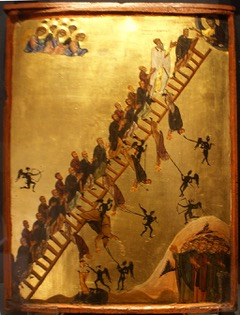Sunday Reflection with Canon Robin Gibbons - August 21 2022

The Ladder of Divine Ascent
21st Sunday in Ordinary Time
One of the delights of the spiritual journey in our Christian tradition is the continual discovery of the immensity of the Holy One as revealed in the Scriptures, but particularly through Christ.
What I am hinting at is the disclosure that we will never fully know nor understand the Almighty One, but the gift given to us, and what we discover in our growing relationship, is an unfolding of the love that is the three persons of the Triune One. If we take an example from the second reading of this Sunday we are drawn up short by an admonition that appears slightly unsettling:
'do not disdain the discipline of the Lord
or lose heart when reproved by him;
for whom the Lord loves, he disciplines'.(Heb 12:6)
Some of us may still remember an older generation's exhortation to put up with hardship in the hope we can be strengthened through it. Many of us still do, but there is our kindly tendency to try and remove the difficulties, to make life easier.
This is not a bad thing except that there are elements of human life we cannot modify in this way, grief and bereavement for instance. To try and hide the word 'died' by supplanting it with 'passed on' or simply 'pass', does not change death. Sanitising the secular funeral rituals to concentrate on thanksgiving for somebody and partying as some adverts suggest) only serves to hold back what is inevitable. We have lost somebody and that is permanent. There is no easy way through grief, but we can bear it and in the process discover we have not lost the love we felt, nor that hope and trust in Christ's promise. So in this sense of having to face the challenges of human life, the discipline of the Almighty is not that of a punitive parent, but an acknowledgement of reality in which our God is present to and with us. It is seen as a process of gradual healing, through our continual training in the ways of truth that leads to another dimension of experience;
'yet later it brings the peaceful fruit of righteousness
to those who are trained by it'.(Heb 12:12)
However those who are called to follow the Christ in the Gospel way might do well to remember that we are always mortals and our capacity to sin is ever there. Of course forgiveness and mercy are ours also, but there is that sense of the discipline of faith, building it up piece by piece, learning from our mistakes, growing in the capacity to have compassion on others as we would so wish for ourselves. So in today's gospel, Luke portrays Jesus challenging us to grow up: 'Strive to enter through the narrow door, for many, I tell you, will attempt to enter but will not be strong enough'.(Lk 13:24) He does not answer the question 'who will be saved' by giving direct answers, instead makes it incumbent upon us all to work harder at the great commandment. Think carefully about that triple edged thrust of love, God, neighbour and self, then let these words sink in:
'And you will say, 'We ate and drank in your company and you taught in our streets.' Then he will say to you, 'I do not know where [you] are from. Depart from me, all you evildoers!'(Lk 13: 26.27) Hard yes, but meant as a cautionary admonition, for to know the Lord is also to grow in faith with Christ, to seek for Christ is to find him in the little ones, if this is what we are doing,then 'all', as Julian of `Norwich tells us, 'will be well'.
Lectio
Karl Barth: Church Dogmatics
But as it confesses God the Church also confesses both the humanity and the responsibility of its action. It realises that it is exposed to fierce temptation as it speaks of God, and it realises that it must give an account to God for the way in which it speaks. The first and last and decisive answer to this twofold compulsion consists in the fact that it rests content with the grace of the One whose strength is mighty in weakness. But in so doing it recognises and takes up as an active Church the further human task of criticising and revising its speech about God.
Ruth Burrows being interviewed about her Lent Book , Love Unknown. March 2012.
I think that anxiety and fear of some kind are part and parcel of being human. I would go so far as to suggest that fear, recognized or not, is our dominant emotion. Our instinct is to run away from fear, to shut it out, to draw the curtains against the dark, to keep ourselves busy, busy, busy so that it doesn't confront us.
To Christians I would suggest that they make a note of how many times in the Gospels Jesus addresses this inherent fear: "Be not afraid." When we think about it, he is the only one able to say this with authority, for he is the answer to our fears-to all of them.
Fundamentally, we are afraid of death and all the diminishments that are mini-deaths, things that damage our sense of self, make us feel insecure, unhappy and so on. In him we have perfect, absolute security. Yes, we must die. Yes, those we love must die, leaving us bereaved. Yes, the world is an uncertain, often threatening place. But we have the absolute certainty of being loved by the all-wise, all-loving Creator who promises us a future of such glory that it outweighs beyond measure the sufferings of this world. My advice to all is to study the New Testament, especially the Gospels, in order to get to know Jesus and so recognize him as the Way, Truth and Life, the one who has come to give us eternal life.


















